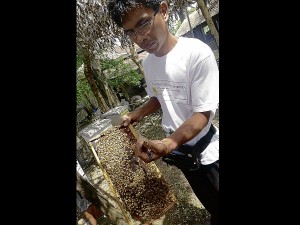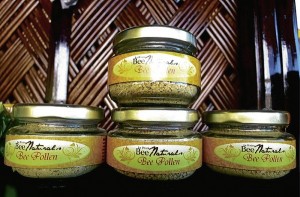Beekeeping is alternate livelihood for La Union’s tobacco farmers

It goes as far as adopting a healthier lifestyle and finding an alternative livelihood in honey production.
According to provincial agriculturist Imelda Sannadan, beekeeping has always been a backyard industry in La Union but it has not really been taken advantage of.
This is because the tobacco industry had provided a good livelihood for the farmers until the global campaign against smoking reduced demand for tobacco leaves.
To give farmers an alternative livelihood, Sannadan says the La Union government started promoting apiculture development in 2000, when Republic Act 9151 was passed.
The law created the National Apiculture Research Training and Development Institute (Nartdi) at the Don Mariano Marcos Memorial State University here.
The La Union Honeybee Center started full operations in September last year to make the province the “honeybee capital of the north.”
“The center serves as a facility for processing raw honey, as well as an equipment store for those who want to start beekeeping,” says Vissia Jadraque, honey equipment operator at the center.

BEE Pollen (top) and Honey and proplis soap products on display. Photo by Marla Viray, Inquirer Northern Luzon
Beekeepers can sell their raw honey for P250 to P270 a kilogram, provided it passes the standard moisture content.
From only 10 beekeepers in 2000, there are now 42 beekeepers, all trained by Nartdi, who comprise the La Union Beekeepers Development Cooperative (Lubdco).
About 70 families, however, engage in private backyard beekeeping in the province, and more farmers are getting interested, says Sanaddan.
However, the honeybee center does not just allow any person to buy equipment and start beekeeping on his own. Training is a requirement before one buys equipment for backyard beekeeping.
“They should first be trained by Nartdi because beekeeping and hive management is not as simple as it looks,” says David de Castro, apiculturist and research assistant of Nartdi.
De Castro says two five-frame nucleus starter hives, costing at least P6,000 each, are needed to start beekeeping. When their population increases and re-hiving is needed, the bees need to be transferred to an eight-frame standard hive.
He says a comb, or one back-to-back frame, contains at least 2,000 bees, producing a minimum of 2.5 kg of honey. There are about 170 starter and standard hives in Nartdi’s apiary in front of the honeybee center.
Records from the Department of Agriculture show that 1,190.571 kg of raw honey were bought from members of Lubdco in February and in first two weeks of March.
The raw honey is processed into bottled pure honey, which is packaged into 300-gram bottles and sold for P130 each, and 10-ml packs sold for P10 each.
Honey byproducts produced in the center include honey vinegar, massage oil, all-purpose balm, honey and propolis (substance collected by bees from leaf buds and tree barks) soap and bee pollen.
Ferdinand Geslani, DA provincial nursery laborer, says the Canadian Executive Service Organization provided technical knowledge and assistance to the center in producing the honey byproducts.
Honey is the One Town One Product (Otop) of La Union. The province’s apiculture program has been cited by the government as the Luzon Island Best Otop Implementor.
